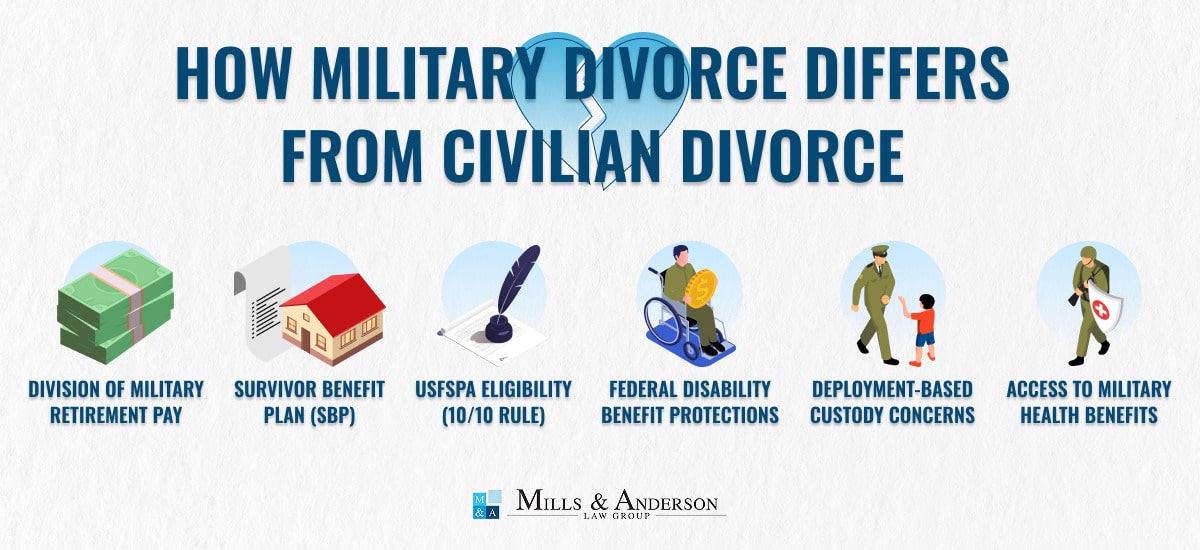Experienced Las Vegas Military Divorce Lawyers

Special provisions of state and federal law apply to a divorce involving active service members and the division of military benefits including retirement pay, receipt of free medical care, the use of military exchanges and commissaries, the division of pension and federal disability payments, and eligibility under the Survivor Benefit Plan.
It is vital that you seek representation from a highly experienced military divorce lawyer Las Vegas that can help guide you through the process and understands the nuances of a divorce involving a military service person.
Special provisions of the law in Nevada also cover child custody and visitation issues involving a parent facing temporary duty, deployment, or mobilization.
In addition to representing active service members stationed at Nellis Air Force Base, the military divorce lawyers at Mills & Anderson also represent veterans from the Army, Air Force, Navy, Marine Corps, Coast Guard, and National Guard.
Many veterans come to the greater metropolitan area of Las Vegas, NV, after their retirement from the military. We represent clients throughout Las Vegas, North Las Vegas and throughout Clark County, NV. Call (702) 386-0030 to schedule a consultation to discuss the unique issues in your case.
Nellis Air Force Base in Clark County, NV
With more than 3,000 housing units and 8,800 employees, the United States Air Force installation is a big part of our community. At least 2,000 families in the area have one or more household members residing on the base or working at the base.
The attorneys at Mills & Anderson are experienced in handling military divorces and other family law matters for active service members and their families working at Nellis Air Force Base in Clark County, NV. We understand the unique issues in these cases and are uniquely qualified to take these cases.
Lifetime Military Retirement Benefits

In order to provide more certainty in these cases, Congress passed the Uniformed Services Former Spouses Protection Act (USFSPA) in 1982. Since then, military pensions have been more uniformly treated as marital property subject to division during a military divorce. The USFSPA does not automatically entitle a former spouse to a portion of the member’s retired pay. Instead, a former spouse must have been awarded a portion of a member’s military retired pay as property in their final court order.
For orders dividing retired pay as property to be enforced under the USFSPA, if the spouse is ordered to receive up to half of the pension then the couple must have been married for at least 10 years of the service. Despite this rule for enforcing the order, the actual terms of the division of the pension can be negotiated for more or less than half.
The USFSPA allows state courts in Nevada to grant up to half of a service member’s retirement pension to the spouse during military divorce proceedings. That is the most the finance center will take out of the retiree’s pay.
In the event the court awards more than half, it becomes the responsibility of the retiree to pay that money directly to the former spouse. If the marriage did not last more than 10 years, then the finance center will not make direct payment to the retiree’s former spouse. In those cases, the court will order the retiree to pay the money directly to his former spouse.
The division of lifetime military retirement benefits is a separate issue from alimony. In many of these cases, if one spouse gave up a career outside the home to support the military spouse, then the court will consider awarding temporary spousal support, alimony or rehabilitative alimony.
Special Protections for Federal Disability Benefits
When granting a military divorce under Nevada law, the Court must make an equal disposition of the community property of the parties and of any property held in joint tenancy by the parties. See NRS 125.150. Nevada’s laws also provide that, under certain circumstances, a court may award alimony or spousal support to either spouse. See NRS 125.150 and 125.210.
When deciding how to divide the community and joint tenancy property, and when making an alimony award, the Court must not:
- attach, levy or seize any federal disability benefits awarded to a veteran for a disability connected to his or her military service; or
- make an assignment of or otherwise divide any such benefits.
In fact, the Court should not even consider any federal disability benefits awarded to a veteran for a disability connected to his or her service in the military when deciding how to divide the community property.
Uniformed Services Former Spouses Protection Act (USFSPA)
The USFSPA, 10 United States Code, section 1408, provides benefits to certain former spouses of military members including retirement pay, free medical care, the use of the military exchanges and commissaries, and eligibility under the Survivor Benefit Plan. The former spouse is not automatically entitled to a portion of the service member’s military retirement based on the length of their marriage. There is no automatic entitlement to a division of retired pay upon divorce.
Instead, the parties may agree, in a separation agreement, to divide retirement pay. If the parties cannot agree, then at trial the court will decide whether the divide the retirement pay and the amount to be awarded to the former spouse. In fact, the USFSPA authorizes state courts, if they so choose, to treat military retirement as marital property that may be equitably divided during the proceeding.
The USFSPA also provides a method for the former spouse to receive their court-ordered share of the retirement benefits directly from the Department of Finance and Accounting (DFAS). DFAS will only pay the former spouse directly, however, if a state court awards a portion of the retirement pay to the former spouse, or the court approves a property settlement incident to the divorce decree that awards a portion of the retirement pay.
Additionally, the 10/10 rule provides that no payments will be made directly to the former spouse by DFAS unless the parties were married for 10 years or more during which the member performed at least 10 years of service creditable in determining the member’s eligibility for the requirement.
Furthermore, the direct payments to the former spouse cannot exceed 50% of disposable retirement pay. In cases where there are payments both under USFSPA and pursuant to garnishment for the child or spousal support, then the total amount of direct payments to the former spouse may not exceed 65% of disposable retirement pay.
The former spouse must apply for direct payment of the court-ordered retirement pay using a completed application form (DD Form 2293) signed by the former spouse together with a certified copy of the court order certified by the clerk of court within 90 days of the application. Payment to the former spouse should begin within 90 days after DFAS receives the completed application.
Under federal law, disability compensation received by the retired service member is not considered part of his or her disposable retirement pay that can be automatically paid under USFSPA. In fact, the USFSPA excludes the Department of Defense and Veterans Administration disability pay from the definition of disposable retired pay. Therefore disability pay is not subject to allocation to the former spouse.
Other Benefits under the USFSPA
A spouse who was married to the military member for 20 years or more during which the member performed at least 20 years of creditable service is authorized to additional benefits including use the commissary, post exchange, and free medical care.
The 20/20 benefits are suspended if the spouse remarries. Alternatively, a spouse who was married to the military member for 20 years or more during which the member performed at least 15 years of creditable service may be authorized to receive medical benefits for 1 year upon which the former spouse may purchase a conversion health policy.
For a former spouse that does not meet these criteria, may still be eligible for the Department of Defense Continued Health Care Benefit Program, which is a premium-based program for 36 months of coverage, if they enroll within 60 days of losing full military health care benefits. The former spouse should also consider the provisions of the Survivor Benefit Plan (SBP). The SBP is an annuity that allows retired service members to provide continued income to a named beneficiary in the event of the retiree’s death.
The order can require a retiring service member to enroll in the SBP and prevent the retiring service member from declining to participate. If the decree requires the retiree to provide the former spouse with SBP coverage, then he or she must make a “former spouse SBP election” with DFAS within 1 year of the date of divorce in order for the former spouse coverage to be implemented.
In some cases, the former spouse may also make a “deemed election” within 1 year of the divorce, but only if the member elected SBP coverage when first eligible to do so. Important and unforgiving time limitations apply so you will need to seek out advice from an experienced military divorce law firm to make sure that your rights to these important benefits are protected.
Additional Resources
Uniformed Services Former Spouse Protection Act (USFSPA) – Visit the website of the Defense Finance and Accounting Service to learn more about the Uniformed Services Former Spouses’ Protection Act (USFSPA), 10 U.S.C. 1408. The USFSPA recognizes the right of state courts to distribute military retired pay to a spouse or former spouse and it provides a method of enforcing these orders through the Department of Defense.
10 U.S. Code § 1408 – Payment of retired or retainer pay in compliance with court orders – Visit the LLI website to read the language of Section 1408 regarding the payment or retirement pay under orders for child support, alimony, or division of property including as a division of community property.
The statute allows the court to treat retired pay as the property of the service member and the spouse. Also, learn more about the benefits for dependents who are victims of abuse by service members losing the right to retired pay.
Serving Those Who Serve — Trusted Military Divorce Lawyers in Las Vegas and Clark County, NV
If you or your spouse are serving in the military at Nellis AFB, then call us to speak with an experienced military divorce attorney about your case. We represent military service members and their families in divorce actions, annulments, legal separations, child custody disputes, and community property settlements in Las Vegas, NV, and throughout the rest of Clark County.
We also represent clients in a variety of issues including:
- Contested Divorce
- Uncontested Divorce
- Incapacitated Divorce
- Military Divorce
- Mediation Divorce
- High Income and High Net Worth Divorces
- Temporary Alimony
- Hidden Assets
Contact Mills & Anderson at (702) 386-0030 to discuss your case with a knowledgeable attorney. Let us help you!

